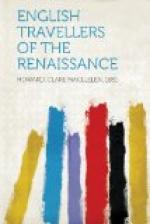Travel, according to our authors, is one of the best ways to gain personal force, social effectiveness—in short, that mysterious “virtu” by which the Renaissance set such great store. It had the negative value of providing artificial trials for young gentlemen with patrimony and no occupation who might otherwise be living idly on their country estates, or dissolutely in London. Knight-errantry, in chivalric society, had provided the hardships and discipline agreeable to youth; travel “for vertues sake, to apply the study of good artes,"[55] was in the Renaissance an excellent way to keep a young man profitably busy. For besides the academic advantages of foreign universities, travel corrected the character. The rude and arrogant young nobleman who had never before left his own country, met salutary opposition and contempt from strangers, and thereby gained modesty. By observing the refinements of the older nations, his uncouthness was softened: the rough barbarian cub was gradually mollified into the civil courtier. And as for giving one prudence and patience, never was such a mentor as travel. The tender, the effeminate, the cowardly, were hardened by contention with unwonted cold or rain or sun, with hard seats, stony pillows, thieves, and highwaymen. Any simple, improvident, and foolish youth would be stirred up to vigilancy by a few experiences with “the subtelty of spies, the wonderful cunning of Inn-keepers and baudes and the great danger of his life."[56] In short, the perils and discomforts of travel made a mild prelude to the real life into which a young man must presently fight his way. Only experience could teach him how to be cunning, wary, and bold; how he might hold his own, at court or at sea, among Elizabeth’s adventurers.
However, this development of the individual was only part of the benefit of travel. Far more to be extolled was his increased usefulness to the State. That was the stoutest reason for leaving one’s “owne sweete country dwellings” to endure hardships and dangers beyond seas. For a traveller may be of the greatest benefit to his own country by being able to compare its social, economic, and military arrangements with those of other commonwealths. He is wisely warned, therefore, against that fond preference for his own country which leads him to close his eyes to any improvement—“without just cause preferring his native country,"[57] but to use choice and discretion, to see, learn, and diligently mark what in every place is worthy of praise and what ought to be amended, in magistrates, regal courts, schools, churches, armies—all the ways and means pertaining to civil life and the governing of a humane society. For all improvement in society, say our authors, came by travellers bringing home fresh ideas. Examples from the ancients, to complete a Renaissance argument, are cited to prove this.[58] So the Romans sent their children to Marseilles, so Cyrus travelled, though yet but a child, so Plato




